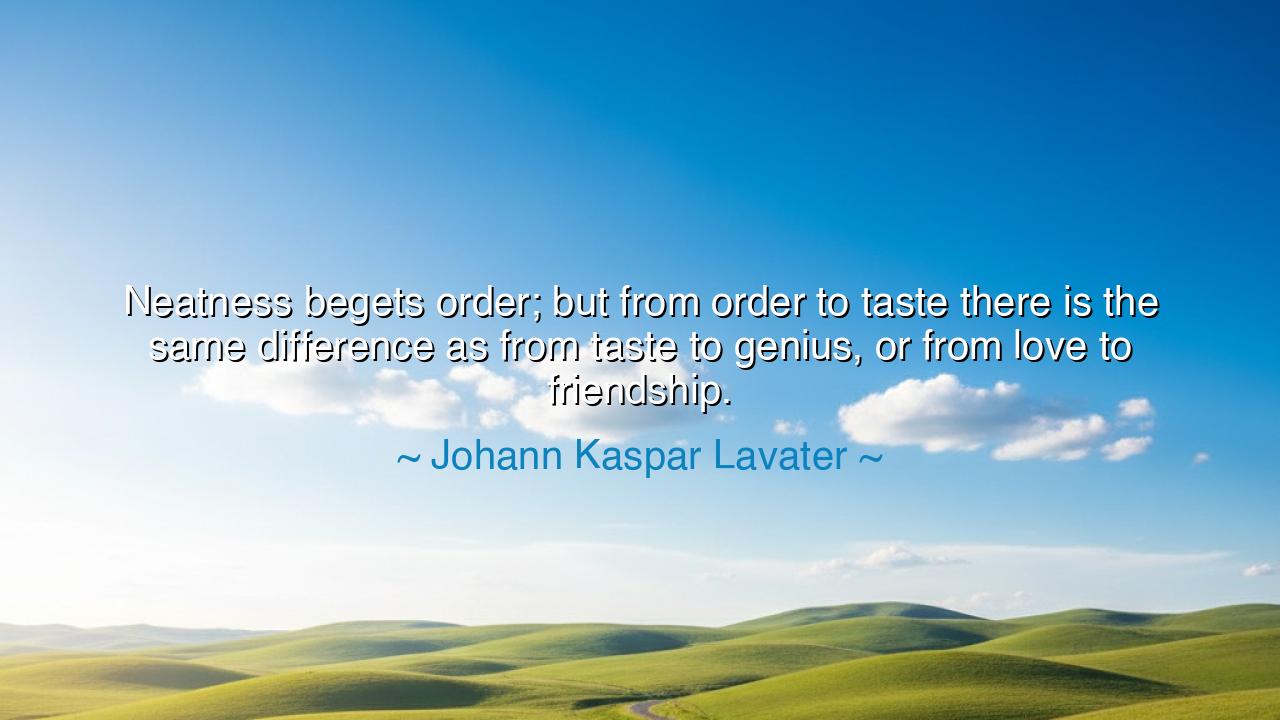
Neatness begets order; but from order to taste there is the same
Neatness begets order; but from order to taste there is the same difference as from taste to genius, or from love to friendship.






"Neatness begets order; but from order to taste there is the same difference as from taste to genius, or from love to friendship." Thus wrote Johann Kaspar Lavater, the Swiss philosopher and theologian, whose reflections upon human nature sought to bridge the visible and the invisible, the outer discipline and the inner flame. In this profound saying, Lavater draws a ladder of refinement — from neatness to order, from order to taste, and from taste to genius — showing how the soul ascends from the material to the divine. Yet he does not stop there. With the same breath, he likens this ascent to the difference between love and friendship, reminding us that all growth — in art, in virtue, in affection — moves from instinct and desire toward understanding and harmony.
At the first step, Lavater places neatness — the care for cleanliness, symmetry, and precision. This, he says, begets order, for when the external world is disciplined, the inner world follows. A tidy room, a well-kept desk, a measured rhythm to one’s days — these are not trivial habits, but the groundwork upon which character is built. Yet, he warns, order alone is not the summit. From order to taste there lies a chasm as wide as that between habit and insight. Taste, in Lavater’s vision, is the refinement of order — the ability not merely to arrange, but to discern beauty, proportion, and meaning. It is the soul’s awakening to harmony, a step beyond the mechanical into the realm of feeling and perception.
But even taste has its limits. Taste arranges beauty; genius creates it. Taste admires the melody; genius composes it. In the same way, Lavater tells us, love feels intensely, while friendship endures wisely. Love may be the fire that kindles, but friendship is the light that guides. Thus, just as there is a vast distance between order and taste, so there is between taste and genius — between mere appreciation and divine inspiration, between passion and wisdom.
Consider the life of Leonardo da Vinci, who embodied this very hierarchy of the soul. His workshop was a place of exquisite order, where every brush and tool found its proper place. Yet beyond order, Leonardo possessed taste — the cultivated sense of harmony that guided his art and invention. But it was his genius that transcended both, for in him, structure gave birth to creation, and precision blossomed into poetry. In the same manner, Leonardo’s relationships, though marked by deep affection, were rooted not in the consuming fire of romantic love, but in the steady flame of friendship, which nourished his mind and spirit alike. His life was the embodiment of Lavater’s truth — that order is the soil, but genius is the flower, and friendship, not love, is the enduring fragrance.
Lavater’s comparison between love and friendship is itself a masterpiece of understanding. Love is the seed of emotion — impulsive, consuming, and often bound to the senses. It is as neatness is to order: beautiful but incomplete. Friendship, however, is love refined — stripped of vanity and passion, clothed instead in loyalty and peace. It does not burn with the fever of desire, but glows with the quiet warmth of understanding. In love, we seek ourselves in another; in friendship, we find another in ourselves. So too with genius — it is not born from mere admiration of beauty, but from the union of order, taste, and imagination, where all elements serve a higher harmony.
In truth, Lavater’s teaching is a call to ascend — in our habits, our art, and our relationships. He reminds us that perfection is not reached by rejecting what is lower, but by refining it. Neatness is not to be scorned; it is the first discipline of order. Order is not to be idolized; it is the path to taste. Taste must not rest content; it must strive toward genius. And in the same way, love, though glorious in its beginnings, must ripen into friendship, that the heart may find lasting peace. Each stage is sacred, but none is final — the soul is called always to ascend from the visible to the invisible, from desire to understanding, from beauty to truth.
Lesson: Strive not only to be neat, but to be ordered; not only ordered, but full of taste; not only tasteful, but touched by genius. In love, seek to become a friend, for friendship is love perfected by wisdom.
Practical action: Begin with the smallest things — clear your space, organize your thoughts, discipline your days. From that order, cultivate taste — notice beauty, harmony, and proportion in the world around you. Then, let genius arise — the courage to create, to see beyond the pattern into the eternal. In your relationships, nurture friendship as the highest form of love, for as Johann Kaspar Lavater teaches, it is in the refinement of both our outer lives and inner hearts that humanity ascends toward its noblest form — the union of simplicity, beauty, and divine wisdom.






AAdministratorAdministrator
Welcome, honored guests. Please leave a comment, we will respond soon